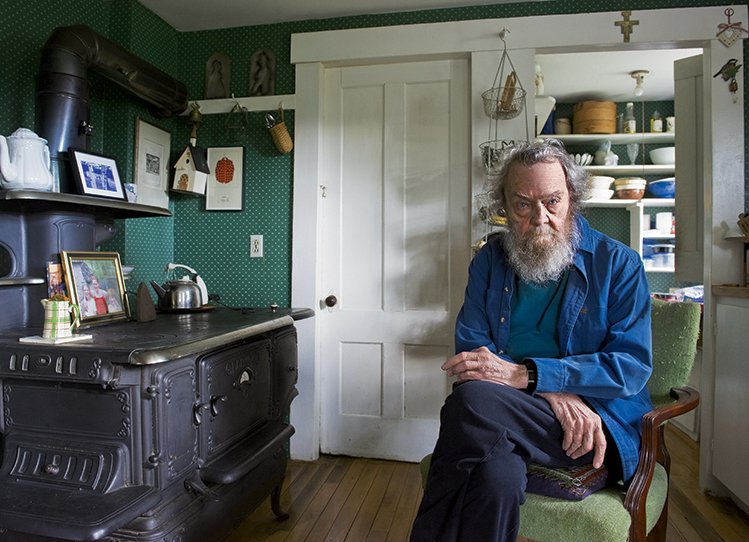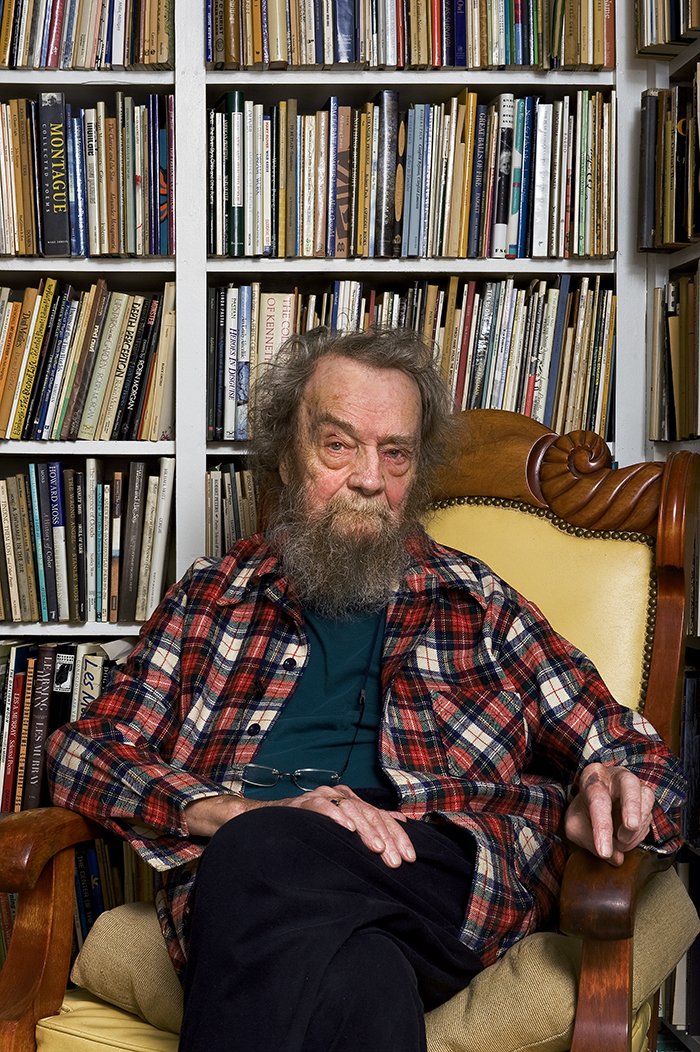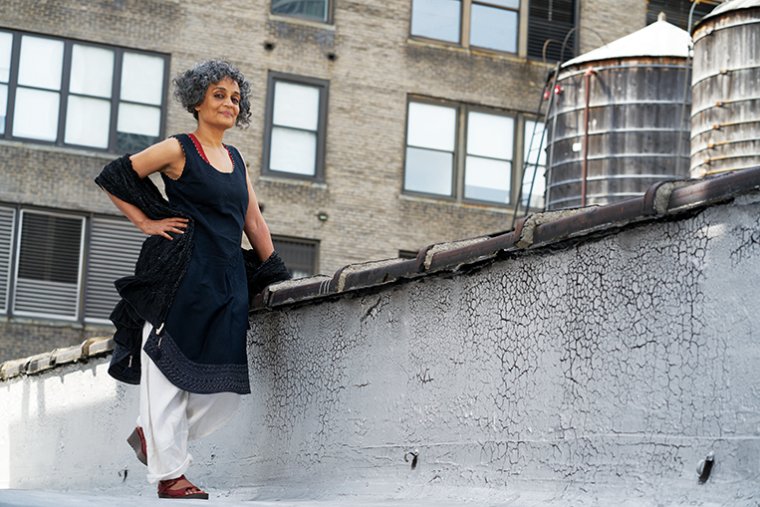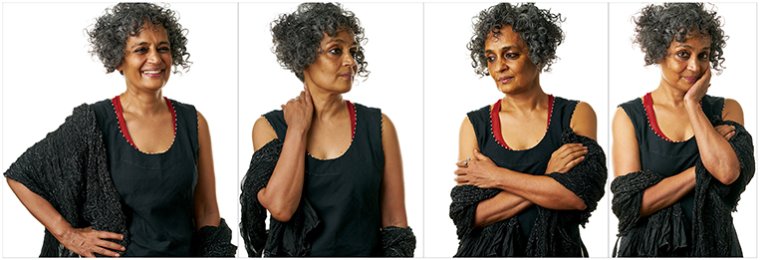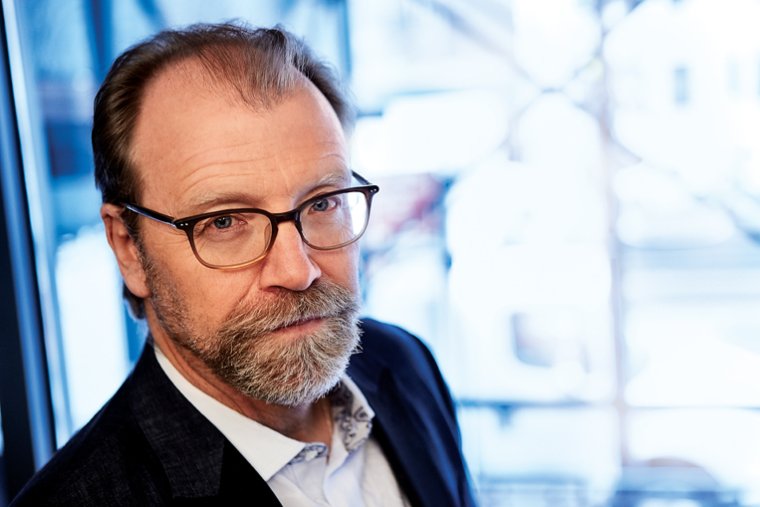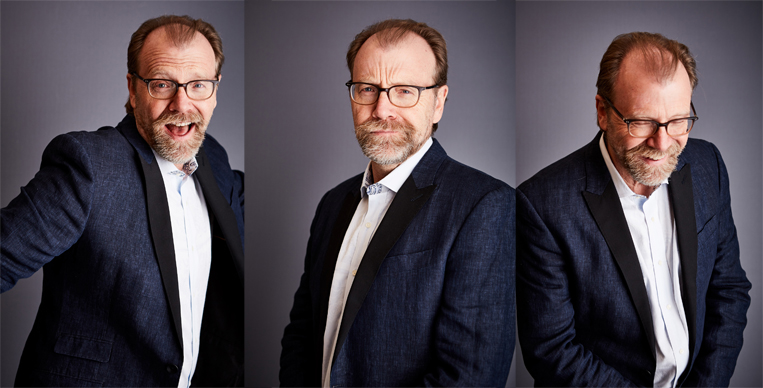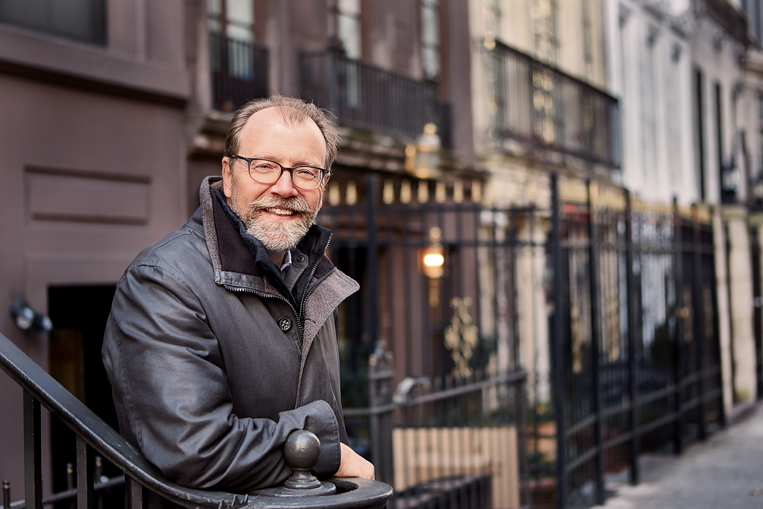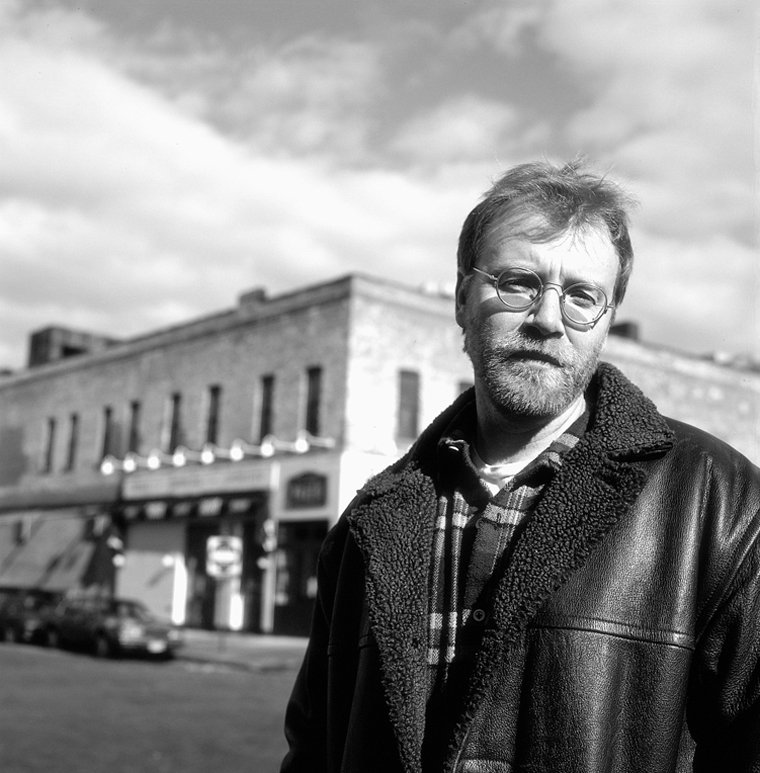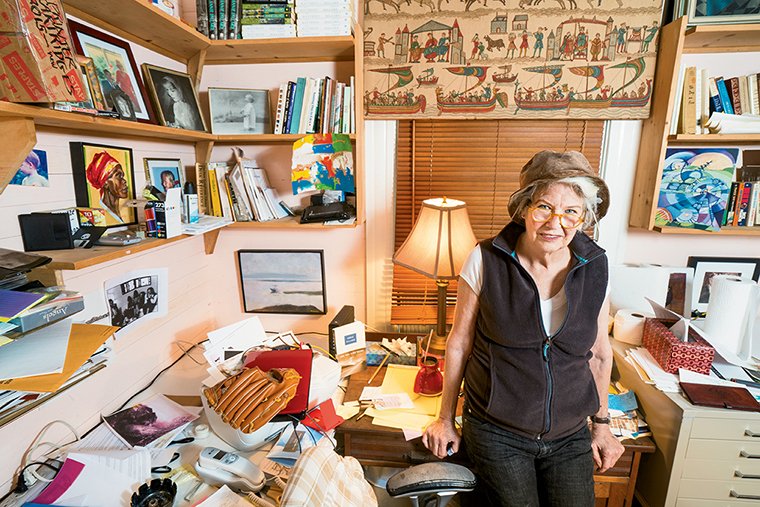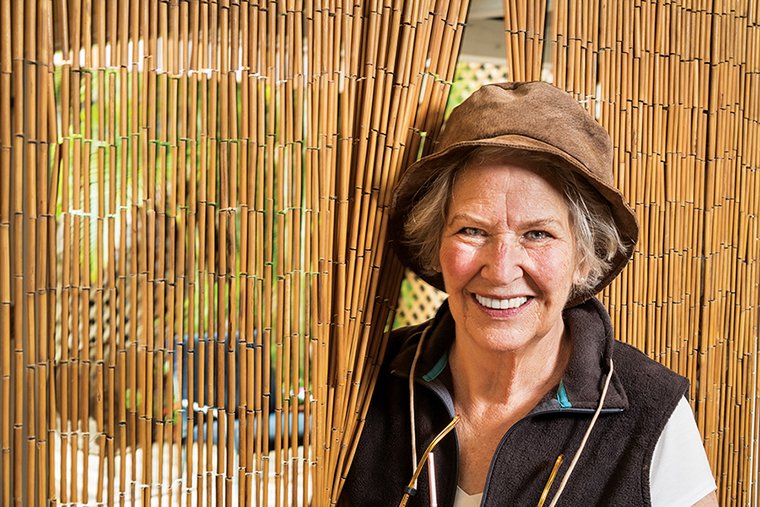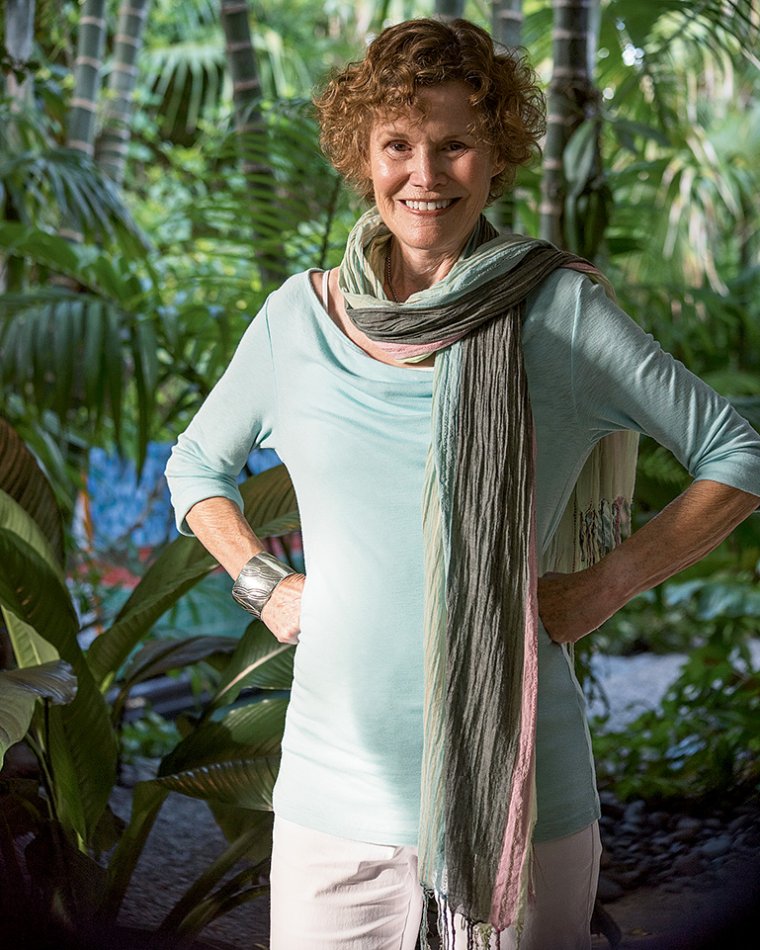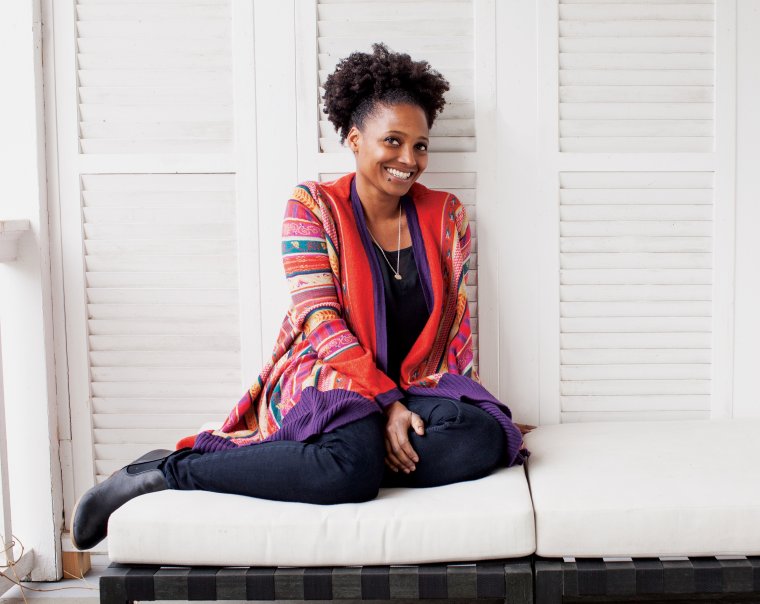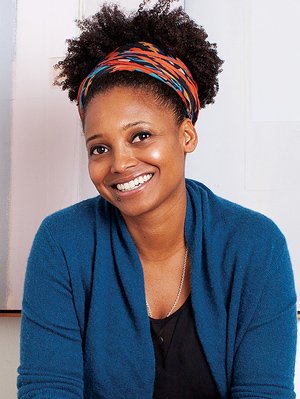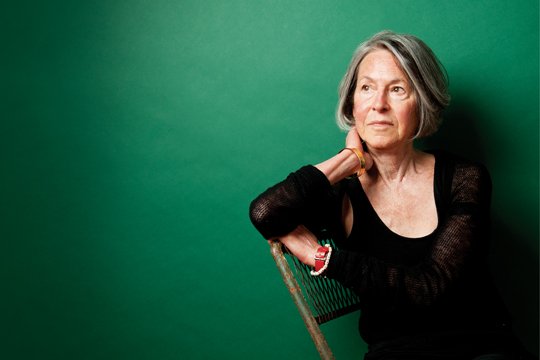I was in New Hampshire when I learned Donald Hall had died. Fitting, as that’s where he’d spent the last forty years of his life, and where I was born. I was a passenger in the family car, my two daughters asleep in the back. My wife drove silently; we were in a fight and not talking. Our silence crowded the small air between us. I was absently scrolling Facebook on my phone when wham: A giant of American letters and former U.S. poet laureate, Donald Hall, was gone. Reading the post a second time my breath hitched. And then I closed my eyes.
I placed the phone face down on my lap. My last letter to Don had remained unanswered; now I knew why. Don and I had been writing each other, on and off, for almost twenty-five years. Ironically, we had never met, but our comradery seemed to grow with every letter.
He died on Saturday, June 23, 2018. And now, less than twenty-four hours later, I pressed my head against the passenger window of our Subaru, not sure what to say, or to whom. As if on cue, a light rain began skidding across the glass. “You’ve got to be kidding me,” I thought.
My family was returning home to the Adirondacks after a much-needed vacation. It had been a glorious week of dry days and azure skies on the beaches of Maine. But a rather nasty fight between me and my wife, Lisa, that morning remained unresolved. It was a completely different vibe in the car than from a week ago, when the ride was filled with chatter and laughter and light.
Lisa flicked the wipers to accommodate the building rain. I didn’t want to tell her, didn’t really know how to tell her. Besides, I was still mad, still hurt from our disagreement. I shifted uncomfortably in my seat as thoughts bounced between the shock of learning about Don’s death and my very first memories of him. My throat grew hot and I acquiesced.
“Hey Lisa,” I said. “You won’t believe the news.”
![]()
In 1994, Lisa and I backpacked through Central America. For several days we stayed at a small hostel called Tres Hermanas (“Three Sisters”) in Nebaj, Guatemala; Nebaj was a former stronghold for the rebels during Guatemala’s civil war of the mid twentieth century. The Mayan people of Nebaj experienced great suffering at the hands of the government during this time.
On our last night in Tres Hermanas, I heard a woman in our room say that she was afraid because the house was on fire. I heard this clearly and in English. Lisa and I were the only guests in the hostel at the time. I nudged Lisa next to me, hoping she was talking in her sleep.
“Lisa, why are you saying the house is on fire,” I asked.
“Go back to sleep,” Lisa said. “You’re dreaming.”
The next morning, during a breakfast of eggs and toast and instant coffee in the garden, I felt relieved in the daylight, and asked Lisa why she seemed unfazed after I told her I heard someone talking in our room. And in perfect English.
“Because I heard the voice too,” she said.
“You did?”
“Yeah, only I heard it in Spanish. I thought if we kept talking it would only encourage the ghost.”
After Lisa’s admission, I was a little freaked out and decided an hour of quiet reading would ground me. At the time, I carried only three books in my rucksack: a copy of the literary journal the Gettysburg Review; Alan Lightman’s Einstein’s Dreams; and Donald Hall’s memoir Life Work. I sought refuge in Don’s book that day, sitting by a koi pond in the Tres Hermanas garden. The mountain air was thin and the sun sharp. Reading a few pages leveled me out, and the experience from the night before grew more ephemeral and distant with each turned page.
As far as memoirs go, Life Work is short, barely over a hundred pages. I picked up a paperback copy for the trip, not having read any of Don’s prose at that point. During my six months on the road, I snatched paragraphs here and there when I could. I ended up reading the book twice, as did Lisa. It became our go-to during arduous bus rides to remote cloud forests or after lunch on non-travel days, wiling away the hours in the Central American heat.
Life Work is a deeply felt meditation on the value of authentic labor. For Don, that meant choosing to be a writer, and not wavering from that path. He meticulously detailed his life and his writing process while living in the New Hampshire home his grandfather bought in the nineteenth century. I swooned, so wanting the life he described. And not only was it a love letter to the written word, it was an actual love letter to his second wife, Jane Kenyon. An acclaimed poet herself, her collection Constance would prove critical in my own development as a writer. Their shared days of quiet writing and revision, coupled with their habitual midday amorous entwinings, followed by yet more diligent writing and revision until dusk, seemed the perfect recipe for how to live.
But the most surprising thing about the book is the abrupt turn it takes halfway through; Don learns he has colon cancer, which then spreads to his liver, and the deep weight of mortality takes hold of his prose, and he starts second guessing if he’s used his time wisely enough to write all the things he knows he needs to write, done all the things he needs to do. And this from someone already so prolific and celebrated. The cruel twist in the book is that he states he won’t live another ten years, but it’s Jane that dies young, contracting Leukemia and dying just a few years after the publication of Life Work. She was forty-seven. Don went on to live almost thirty more years after his own prognosis and died at the age eighty-nine.
I had originally been introduced to Don’s work when I was an undergraduate—specifically his book of poems Kicking the Leaves. I grew to love the fact that there was a famous poet actually living in my tiny home state. “Well, I better introduce myself to him,” I thought, “Poet to poet.” I began corresponding with Don the week after I graduated.
At first I gushed like any old fan, but after a couple of letters I shared that I had grown up in Exeter. Don attended Philips Exeter Academy for two years, a time he later described to me as “the most wretched in (his) life.” He loved that I told him I was a townie and had only dated the academy girls to spite the academy boys.
I later sent a batch of poems and proclaimed I sought no praise (though I surely did) and he was gracious in his remarks, bestowing words of encouragement and hope. He knows a poet just starting out in his twenties usually looks for approval and guidance from the old guard, even though said poet is too cool to admit it. “You’ve got something here, and I appreciate the energy in these poems,” he wrote.
I stood in the kitchen of my apartment in Portsmouth, New Hampshire, reading and rereading those words, and cared little to hide my joy.
![]()
We crossed into Vermont via Lebanon, New Hampshire, and I grew restless. Lisa was tired and needed a break from driving. I suggested an upcoming rest stop.
“Not yet,” she said without looking at me. “I’m fine.
Lisa’s words had the weight of accusation, but I didn’t engage. Instead, I glanced over my shoulder at the girls. Both were now awake and beholders of similar expressions—earbuds and indifference. I turned back around and briefly considered Lisa’s silhouette, remembered a happier time:
It was 2012 and we were in Guanajuato, Mexico for six months. A boisterous little city teeming with ex-pat writers and artists, Guanajuato is a Unesco World Heritage site, resembling more a classic Italian hill town than a Mexican pueblo: the brightly painted homes and buildings are built into the sides of the mountain, spilling into the valley below. Church bells announce the hours throughout copious, leafy plazas and everywhere is colonial architecture maintained with striking precision. It was a magical six months.
Towards the end of our stay, Don published an essay in the American Scholar about a trip to Europe he took in the 50s with his first wife, Kirby. The piece was both telling and sad, but rich with detail. Kirby too died of cancer, just like Jane, but Don was grateful it brought he and Kirby back together after many years of estrangement. I read the essay all at once one morning in bed, the house to myself as the girls were all off to class. The ending made me cry, particularly because of this line in the last paragraph: But there are no happy endings, because if things are happy, they have not ended. A year later, I’d ask Don to borrow that line as an epigraph for a poem I was working on about the complexities of my own marriage. But that day, I sent Don an e-mail to let him know how moving the essay was, and how it affected me so deeply way down here in Mexico.
Don’s reply came quick and filled with verve. He was grateful for my e-mail, and discussed his own time he spent in Mexico in the nearby city of San Miguel de Allende. In fact, it turned out we were both in San Miguel the same year (2007) for two different writing festivals: one where I taught a poetry workshop in the spring and the other in the fall where he went to simply be “fawned over and celebrated.” Not a bad deal, I told him.
I shared new poems, and of one in particular he said “…fills every rift with ore.” With his own tip of the hat to Keats, I was overcome by such high praise. But he didn’t always love what I wrote, once calling an image of mine “metaphor-chowder.” Fair enough, I thought, and quickly scrubbed the lines clean.
We exchanged travel stories: his tales of India with Jane, and mine about my naïve adventurism on another occasion in Mexico during the Zapatista uprising when I was almost shot pointblank in the face by a soldier. Don loved that one. He told me new essays were coming out in the New Yorker and Playboy and I joked that I could finally say I was reading Playboy for the articles and actually mean it.
In another letter, Don expressed that poetry had left him, and that he was no longer writing poems. But it wasn’t seen by him as a loss as he was still pumping out essays and that he had said everything he needed to say in poetry. But still, I was saddened to learn the news. At 82, this struck me as perhaps his first step off the proverbial mortal coil, but I kept that observation to myself.
A few years later, solidly back home and teaching English again, I wrote Don about two new books I had forthcoming, both about Mexico. One was a collection of poems, the other poems and essays about Guanajuato. I beat around the bush and finally asked sheepishly is he’d offer a blurb. I was surprised to learn it was his policy never to write them:
“Back in 1960—I do believe!—I decided never to write another blurb. I had written a few, which were terrible, and so were most people’s. The last one I wrote was for X. J. Kennedy with whom I workshopped in Ann Arbor. Since then, I’ve told my poet friends about my decision—at least ten thousand times—and I can’t change my mind at this point.”
I thanked him anyway, and as I was serving as the nonfiction editor for Slice, a burgeoning literary magazine out of Brooklyn, I had another idea about how we might be able to collaborate: I asked if he had any essays he might want to offer Slice for publication. We paid a modest fee, but I hoped Don would appreciate the earnestness with which I made my pitch; many notable writers spoke highly of Slice and I shared their words.
He said yes, but that he had only two essays remaining from his forthcoming collection Essays After Eighty that had not been placed in magazines. Yet neither of those two would do, he said. He proposed a compromise:
“I am writing a tiny essay which might well do for Slice, and would not do for the New Yorker et cetera. My editor asked me to write a piece, something short to be printed between the first essay and the next. It’s about going from poetry to prose, and the pleasures of prose, and hints about writing memoir. I think it might do for Slice, with a note saying how it was conceived, and that it will be part of Essays After Eighty. I’m still working on it, and I might take another month. (I have only written twenty drafts.) Then let us see.”
A month later, he had his assistant e-mail me the finished piece, called “From Poems to Paragraphs,” which was really a collection of flash-essays operating as anecdotes and insights detailing his revision process; all of his essays went through a minimum of thirty drafts, some eighty. As promised, he also discussed his change to writing solely prose. “Originally I wrote ‘poetry suddenly left me’ which after twelve drafts became ‘poetry abandoned me’—with another sentence to avoid self-pity.” His wit and humor were as sharp and observant as ever, and the piece just sang. I was eminently grateful, but to Don, eh, no big deal. “Glad you liked the piece,” was all he said. Incidentally, when the book came out, the name of the essay was changed to the title essay itself: “Essays After Eighty.” I couldn’t have been more proud.
![]()
Lisa bisected Vermont’s Green Mountains slowly and with care. At one point, we stopped behind a Honda Accord marooned in the middle of the road. The rain had finally let up and everything glistened. We inched around slowly, the driver excitedly pointing while mouthing the word “Moose” behind the glass at me.
We didn’t see anything, but later read in the paper that an albino moose was galloping through the area at the time. Something that large and that white must have looked absolutely terrifying.
We passed by Bread Loaf, which was on the way, a rather strange collection of yolk-colored houses lining either side of the road just outside of Middlebury. You already know enough about the writing conference—even The Simpsons has parodied it. Don was accepted to Bread Loaf when he was a teenager. He once wrote to me: “I went to Breadloaf (sic) in 1945 when I was 16. Can you imagine what it feels like to write that sentence?”
So how perfect was it that I dropped my cell phone between the seats and couldn’t reach it as we drove by, me cursing softly, finally unbuckling my seatbelt and grabbing wildly to no avail.
“Jesus, let me pull over,” Lisa said.
I opened the door and got out, dropped to my knees on the damp asphalt. I finally grabbed my iPhone and pulled it free, slicing the top of my hand as I did.
Wincing, I stood up catching my breath, and took all of Bread Loaf in in that moment: the wide and perfect green lawns, a couple walking by arm in arm, those strangely yellow houses. And then I imagined Don as fresh-faced teenager in search of a voice, standing alone on one of the wraparound porches beside me.
I suddenly wanted to cry. I felt his loss like the Vermont air pressing my skin and filling my lungs. I knew in that moment that I didn’t tell him everything that I wanted to, or that I should have. Though we spoke about solitude at length, I didn’t ask him enough questions about loneliness, or if he feared death. I didn’t say simple things like, Hey man, how the hell are you? and instead fretted if my letters were ‘poetic enough’. I felt—as I had felt many times in my life before—that I had once again found a way to squander something important and there wasn’t a damn thing anyone could do about it, least of all me. He once asked that I call him so we could arrange a time to get together, saying that he ‘so wanted to meet me,’ but I was busy, busy, busy, traveling from one country to the next, thinking Yeah, yeah, I will. Later. I had now run out of laters.
“Chris, are you okay,” Lisa asked, leaning over the passenger seat and speaking up to me.
I ran my hand through my hair. Would this be my stupid fate? Would I just keep fucking things up, over and over, allowing important people and moments to slip away until I had nothing left? I looked back at my wife, my love, and thought how lucky I was to have this woman in my life all these years.
“Um, yeah, I’m fine,” I said. “Do you…do you need me to drive now?” Lisa smiled. But I didn’t wait for her answer. I simply walked around the car and gently opened her door.
Christopher Locke’s poems and essays have appeared in the North American Review, the Rumpus, the Sun, Poetry East, Verse Daily, Southwest Review, Slice, the Literary Review, West Branch, 32 Poems, SmokeLong Quarterly, and Saranac Review as well as on NPR’s Morning Edition and Ireland’s Radio One. Locke’s most recent book is Ordinary Gods (Salmon Poetry, 2017), a collection of poems and essays detailing his twenty-five years of travel throughout Latin America. Locke is the winner of the 2018 Black River Chapbook Competition, a Dorothy Sargent Rosenberg Poetry Award, state grants from the Massachusetts Cultural Council and the New Hampshire State Council on the Arts, and residencies from Fundación Valparaíso (Spain) and PARMA (Mexico). He teaches creative writing online at the Poetry Barn and in person at North Country Community College in the Adirondacks.

